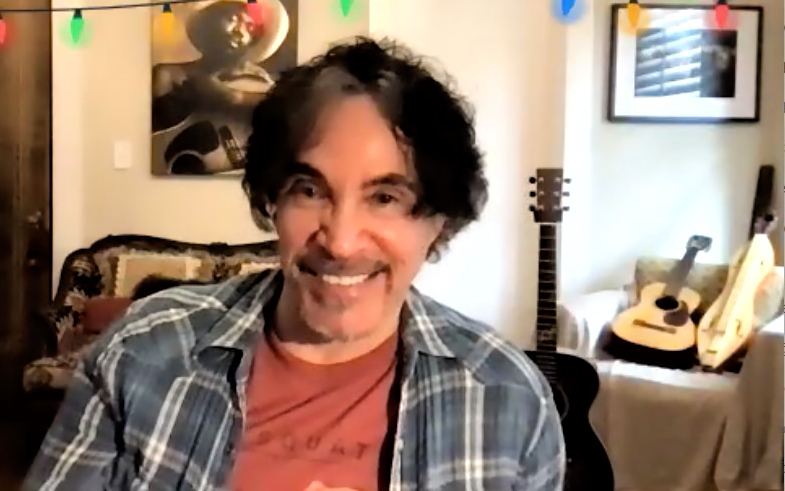It was yet another epic afternoon on Friday, April 23, when USC’s Founder of the Contemporary Music Program, Chris Sampson, hosted a virtual SHOF Master Session at USC Thornton with special guest, 2004 SHOF inductee John Oates.
Sampson began by saying that this was the finale pop forum of the academic year, and that these SHOF Master Sessions have become an integral part of the USC Thornton curriculum, enabling them to exceeded their mission in education.
SHOF Board Member and West Coast Committee chair Mary Jo Mennella added, “It's an honor to be a part of your world.” She said this is the twenty-third SHOF / USC Master Session and each one has been unique and special.
Sampson then introduced John Oates, saying he is an accomplished solo artist, Rock & Roll Hall of Fame inductee, BMI Icon awardee and is, with fellow SHOF inductee, Daryl Hall, half of one of the most successful performing duos in rock history.
Daryl Hall and John Oates started working together in the early 1970's, and together they have sold over 60 million albums. Their rich repertoire has garnered a total of 8 #1 hit singles along with dozens of hits throughout the 70's, 80's, 90's, and most recently 2002's Do It For Love. Other top singles include: Rich Girl, Kiss On My List, Maneater, Private Eyes, I Can't Go For That (No Can Do), Sara Smile, She's Gone, and One On One.
Sampson asked how it all began, and Oates said he was always a musician and a singer, making his first record in 1967, and meeting Daryl Hall shortly afterward. “Philadelphia was a hot-bed of interesting music, even prior to Gamble & Huff. I saw all of the greats and realized something different and new was happening when rock & roll was born. There was an incredible opportunity to learn from the originators back then.”
Oates spoke about his unique relationship and 50-year partnership with Daryl Hall saying, “We have the same musical vocabulary and lexicon and our desires and goals are the same. It’s unusual to have someone who shares your same musical roots with the same drive, but you can trust them.”
Sampson pointed out that a lot of Oates’ early song ideas came from his diary, and from being an excellent observer of life. Oates said he kept a journal for 10 years, using his observations as creative inspiration. This also became the basis of his memoire: Change of Seasons.
Sampson said, “Yours is a story of perseverance, because you didn't think it would happen at all.” Oates agreed saying, “We were part of the great tradition of being screwed in the industry.” Oates and Hall struggled for years until they flew to LA to meet Earl McGrath who called Ahmet Ertegun, and the rest is history. “It's all about belief in yourself and dedication, and there is no reason why anyone should be limited in their aspirations.”
Sampson gave Daryl Hall and John Oates credit for their early experimentation with sounds and said “you took a lot of risks with your early records.” Oates replied, “Arif Mardin produced us...he thought about music in pure terms and didn't care what was happening in the industry.”
After proclaiming his dislike of song medleys, Oates cheerfully contradicted himself by serenading everyone with his first three hits: Sara Smile, Rich Girl and She's Gone, thrilling all who were in attendance.
Sampson commended Oates saying, “You took yourself to school in theory and music training after you'd had many hits, continuing your investment in yourself.” Oates replied, “I was getting by on having a good ear, but knew I wasn't there. I did an intensive course to get a foundation in theory in order to communicate with any musician so they understand what I'm trying to get at.”
Sampson opened the floor to student questions, one of which was, “What does your songwriting process look like now?” Oates replied, “There are no rules and it can come from an insignificant moment or a groove or a chord progression. None of our hits sounds like another one...we avoided that.”
Sampson then introduced USC students Ted Bordeau, Sean Moran, Jack Maitra, Johnny May, Jack Severino, Eli Bramnick and Dominic Anzalone who performed spot-on renditions of several Daryl Hall and John Oates songs.
Oates wound up the session by imparting this wisdom to the students; “Everyday triggers can become the catalyst for a song which demonstrates that uncanny ability songwriters have to translate the world via music.”
Mennella gave special props to USC’s Chair, Popular Music Program, Patrice Rushen, a respected singer/songwriter/music director/conductor/arranger for coordinating the outstanding musical tributes the students have arranged for this and other SHOF / USC Master Sessions.
SHOF president & CEO Linda Moran stated, "The SHOF / USC Master Sessions featuring songwriters of the highest calibre, using John Oates as an example, has become the flagship program for the SHOF." Also in attendance were SHOF West Coast Committee co-chair Kathy Spanberger, West Coast events director Barbara Cane, SHOF West Coast Committee members Joel Flatow, Michael Pizzuto and Mike Todd, SHOF Board Member Charlie Feldman and the SHOF’s April Anderson.
The SHOF/USC Master Sessions have hosted events featuring David Foster, Billy Steinberg, Benny Blanco, Graham Nash, Donovan and Ralph Peer, Bill Withers, Linda Perry, Desmond Child, Lamont Dozier, Imagine Dragons’ Dan Reynolds and Evan Lamberg, Carole Bayer Sager, Irving Burgie, Barry Mann and Cynthia Weil, Paul Williams, Steve Dorff, Jason Mraz, Allee Willis, Jackie DeShannon, Michael Bolton and Ne-Yo.


